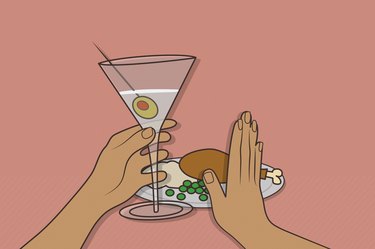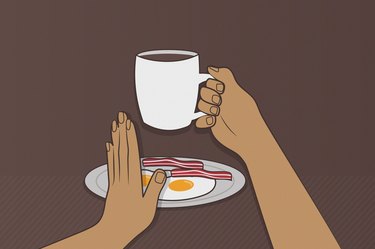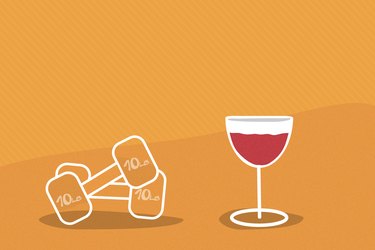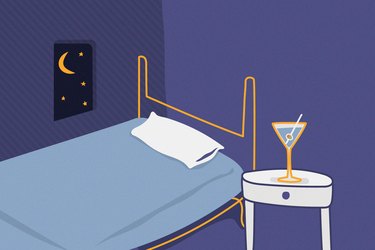
Maybe you swing by happy hour before you've had a chance to eat, order a cocktail while waiting for your restaurant table to open up, or sip a glass of pinot when cooking dinner.
You've probably noticed that you start to feel tipsy faster without food in your system. And while alcohol may have some modest health benefits in general, you might question whether alcohol on an empty stomach is particularly bad. Here, we uncover the sobering truth.
Video of the Day
Video of the Day
Food Changes the Way You Process Alcohol
When you crack open a White Claw sans food, it passes quickly through your stomach and enters your small intestine. There, it's immediately absorbed through epithelial cells, which bring it into your capillaries, where your blood vessels carry it throughout your body and brain, eventually ending up in your liver.
It's a different story if you've eaten in the last couple of hours, which is about how long food stays in your stomach.
"There's truth to the fraternity adage that you should have a glass of milk before you go out to party," says George F. Koob, PhD, director of the National Institute on Alcohol Abuse and Alcoholism (NIAAA). "It doesn't have to be milk, but anything that coats the stomach and intermixes with the alcohol will slow its absorption."
In fact, a January 2005 BMJ study (that's still widely cited) found that food slows the rate of alcohol absorption by up to 75 percent.
This is all thanks to the pyloric sphincter, a valve that connects your stomach and small intestine. According to the Alcohol Pharmacology Education Partnership at Duke University, the pyloric sphincter closes when you're digesting a meal in order to keep the food in your stomach longer, where stomach acid can help break it down. When the pyloric sphincter is shut, alcohol can't enter the small intestine right away. As a result, it is absorbed into your bloodstream much more slowly.
4 Side Effects of Alcohol on an Empty Stomach
1. Your Blood Alcohol Level Will Be Higher
OK, so now that we've gotten bio class out of the way, what exactly happens to you when alcohol is rapidly absorbed? "You are more likely to feel the effects faster," says Marvin Singh, MD, director of integrative gastroenterology at the Susan Samueli Integrative Health Institute at UC Irvine, assistant clinical professor of family medicine and public health at UC San Diego and founder of Precisione Clinic.
Koob explains that if you were to chart your blood alcohol level when drinking on an empty stomach, the curve would look like a steep cliff; with a full belly, the trajectory resembles a gentle mound.
"People don't intravenously inject alcohol, but on a completely empty stomach that is as close as you get — it is shooting right into your bloodstream," he says. "Your blood alcohol level will show a sharp rise and much larger peak because it's all getting absorbed at once."
With the presence of food, the peak is gradual and blunted.
2. You’re More Likely to Get Wasted
When there's no grub in your system, you're more prone to the hallmarks of intoxication: dizziness, nausea, vomiting, disinhibition, loss of motor skills and mood swings.
"The rapid rise in blood alcohol level can lead to these side effects," Koob says. A blood alcohol level of 0.08 or above is considered legal intoxication — and you'll reach that point faster if you haven't chowed down.
"And remember that alcohol affects your ability to make smart decisions," Dr. Singh says. "When your judgment is impaired, you might be more inclined to keep drinking more than you should or typically would."
3. Your Stomach Might Hurt — or Worse
Drinking alcohol can cause gastritis, where the lining of your tummy becomes irritated and inflamed.
"The higher the concentration of alcohol, the more gastritis you get," Koob says. "Gastritis can actually tear the mucosal lining of your stomach, leading to internal bleeding."
He points out that people could potentially end up in the ER with stomach bleeds, and in severe cases it can be life-threatening.
Risk factors include drinking quickly and/or excessively, beverages with a high alcohol content (for example, a shot is more potent than a beer), and, yes, getting your buzz on with an empty stomach.
All of these factors cause your blood-alcohol level to skyrocket, upping the likelihood that you'll damage your mucosal lining and induce inflammation, Koob says.
What's more, if you're drunk enough to hurl, "vomiting can irritate the stomach lining and contribute to gastritis," Koob says.
4. Your Risk of Esophageal Cancer Could Go Up
"It is well established that alcohol use at any level contributes to esophageal cancer," Koob says, "and I suspect the risks are even higher if you have an empty stomach."
If you're Asian, heads up: You're at increased risk. "About 30 percent of Asian-Americans don't metabolize alcohol when it gets to the acetaldehyde stage," Koob says. "This leads to local, acute increases in acetaldehyde, which has a carcinogenic effect."
Red flags include getting flushed and feeling dizzy. "If you continue drinking past that effect, you have a 10-fold higher likelihood of developing esophageal cancer."
3 Tips to Minimize Negative Side Effects
If you do decide to knock one back on an empty stomach, heed this advice.
1. Limit Yourself
Although the Centers for Disease Control and Prevention recommends limiting alcohol intake to one drink per day for people assigned female at birth and two for people assigned male at birth, Koob suggests maxing out at half a drink max for the former and one for the latter if you haven't eaten.
"Maybe just a sip is enough to give you that relaxed feeling," he says.
2. Take It Slow
"Your liver can metabolize about half a drink per hour," Koob says.
3. Listen to Your Body
"If you have hunger pangs or start to feel a little tipsy, those are warning signs to back off and have a modest to substantial snack before partaking any further," Koob says.
What Are the Best Foods to Eat Before Drinking?
The BMJ study found that carbs were most efficient, while the Alcohol Pharmacology Education Partnership says a fatty meal can slash blood alcohol concentration by 50 percent.
But ultimately, the jury's still out on which food most effectively put the brakes on alcohol absorption. "There is no evidence that I have ever uncovered that carbs, protein or fats are any different," Koob says. "It seems to be more about the amount that you eat rather than the specific food."
Avoid These 3 Drinks on an Empty Stomach
1. Hard Alcohol
"You will have more rapid absorption than if you are drinking a couple of beers or a glass of wine," Koob says.
Check out the NIAAA's Cocktail Calculator to see how much alcohol is in your favorite mixed drink.
2. Bubbly Bevvies
"Carbonated drinks are absorbed more quickly, perhaps due to the carbon dioxide," Dr. Singh says.
3. Straight Booze
If you skip the mixers, your blood alcohol content will soar faster.
"A sugary drink will buffer some of the rise in blood alcohol level," Koob says. "On the other hand, with a sweet drink you might not even notice the alcohol, so it's harder to realize that you are getting intoxicated."
So, How Bad Is It Really to Drink on an Empty Stomach?
Honestly, it's never a great idea. The extent of the damage depends on what you're drinking, how much you toss back, how fast you're imbibing and how empty your stomach is (hitting the sauce will be more dangerous if you haven't eaten all day compared to if it has just been a few hours).
Bottom line: Play it safe and pack a snack!
Is this an emergency? If you are experiencing serious medical symptoms, please see the National Library of Medicine’s list of signs you need emergency medical attention or call 911.



